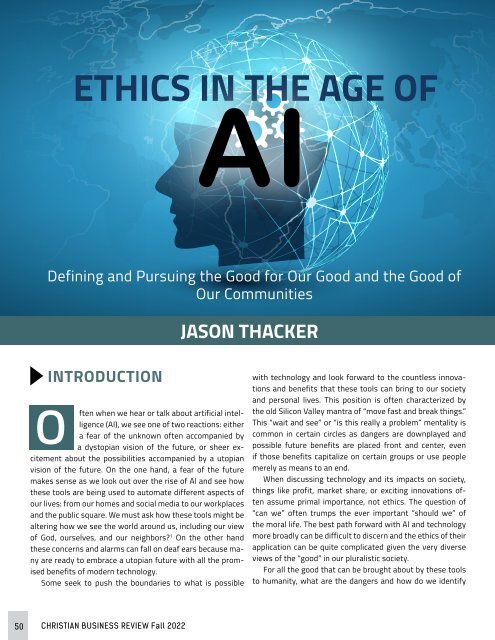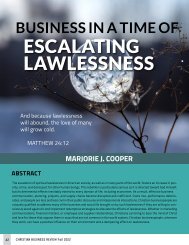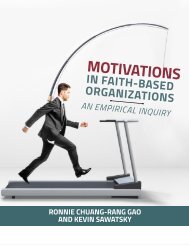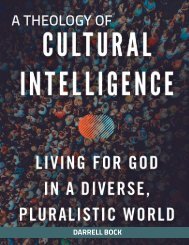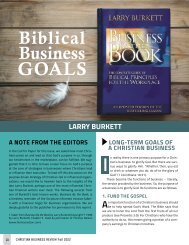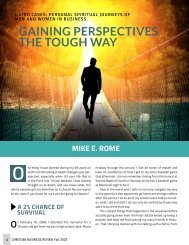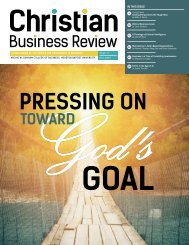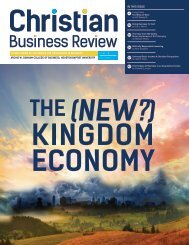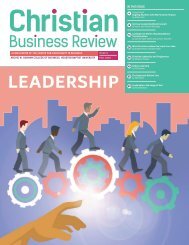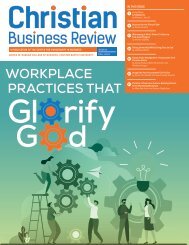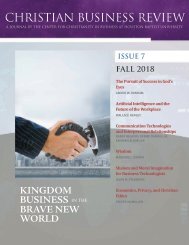Ethics in the Age of AI by Jason Thacker (CBR 2022)
You also want an ePaper? Increase the reach of your titles
YUMPU automatically turns print PDFs into web optimized ePapers that Google loves.
ETHICS IN THE AGE OF<br />
<strong>AI</strong><br />
Def<strong>in</strong><strong>in</strong>g and Pursu<strong>in</strong>g <strong>the</strong> Good for Our Good and <strong>the</strong> Good <strong>of</strong><br />
Our Communities<br />
JASON THACKER<br />
INTRODUCTION<br />
O<br />
ften when we hear or talk about artificial <strong>in</strong>telligence<br />
(<strong>AI</strong>), we see one <strong>of</strong> two reactions: ei<strong>the</strong>r<br />
a fear <strong>of</strong> <strong>the</strong> unknown <strong>of</strong>ten accompanied <strong>by</strong><br />
a dystopian vision <strong>of</strong> <strong>the</strong> future, or sheer excitement<br />
about <strong>the</strong> possibilities accompanied <strong>by</strong> a utopian<br />
vision <strong>of</strong> <strong>the</strong> future. On <strong>the</strong> one hand, a fear <strong>of</strong> <strong>the</strong> future<br />
makes sense as we look out over <strong>the</strong> rise <strong>of</strong> <strong>AI</strong> and see how<br />
<strong>the</strong>se tools are be<strong>in</strong>g used to automate different aspects <strong>of</strong><br />
our lives: from our homes and social media to our workplaces<br />
and <strong>the</strong> public square. We must ask how <strong>the</strong>se tools might be<br />
alter<strong>in</strong>g how we see <strong>the</strong> world around us, <strong>in</strong>clud<strong>in</strong>g our view<br />
<strong>of</strong> God, ourselves, and our neighbors? 1 On <strong>the</strong> o<strong>the</strong>r hand<br />
<strong>the</strong>se concerns and alarms can fall on deaf ears because many<br />
are ready to embrace a utopian future with all <strong>the</strong> promised<br />
benefits <strong>of</strong> modern technology.<br />
Some seek to push <strong>the</strong> boundaries to what is possible<br />
with technology and look forward to <strong>the</strong> countless <strong>in</strong>novations<br />
and benefits that <strong>the</strong>se tools can br<strong>in</strong>g to our society<br />
and personal lives. This position is <strong>of</strong>ten characterized <strong>by</strong><br />
<strong>the</strong> old Silicon Valley mantra <strong>of</strong> “move fast and break th<strong>in</strong>gs.”<br />
This “wait and see” or “is this really a problem” mentality is<br />
common <strong>in</strong> certa<strong>in</strong> circles as dangers are downplayed and<br />
possible future benefits are placed front and center, even<br />
if those benefits capitalize on certa<strong>in</strong> groups or use people<br />
merely as means to an end.<br />
When discuss<strong>in</strong>g technology and its impacts on society,<br />
th<strong>in</strong>gs like pr<strong>of</strong>it, market share, or excit<strong>in</strong>g <strong>in</strong>novations <strong>of</strong>ten<br />
assume primal importance, not ethics. The question <strong>of</strong><br />
“can we” <strong>of</strong>ten trumps <strong>the</strong> ever important “should we” <strong>of</strong><br />
<strong>the</strong> moral life. The best path forward with <strong>AI</strong> and technology<br />
more broadly can be difficult to discern and <strong>the</strong> ethics <strong>of</strong> <strong>the</strong>ir<br />
application can be quite complicated given <strong>the</strong> very diverse<br />
views <strong>of</strong> <strong>the</strong> “good” <strong>in</strong> our pluralistic society.<br />
For all <strong>the</strong> good that can be brought about <strong>by</strong> <strong>the</strong>se tools<br />
to humanity, what are <strong>the</strong> dangers and how do we identify<br />
50<br />
CHRISTIAN BUSINESS REVIEW Fall <strong>2022</strong>
ETHICS IN THE AGE OF <strong>AI</strong><br />
<strong>CBR</strong> ARTICLES<br />
<strong>the</strong>m? Is <strong>the</strong>re a set <strong>of</strong> moral pr<strong>in</strong>ciples or ideas that society<br />
at large and bus<strong>in</strong>esses <strong>in</strong> particular can agree upon that<br />
would help us navigate <strong>the</strong> epoch <strong>of</strong> <strong>AI</strong>? How might we protect<br />
<strong>the</strong> humanity <strong>of</strong> our neighbors while pursu<strong>in</strong>g God-honor<strong>in</strong>g<br />
<strong>AI</strong> <strong>in</strong>novations?<br />
To help answer <strong>the</strong>se types <strong>of</strong> questions and o<strong>the</strong>rs confront<strong>in</strong>g<br />
<strong>the</strong> church today, this article will first def<strong>in</strong>e <strong>AI</strong> and<br />
address how it is shap<strong>in</strong>g our view <strong>of</strong> <strong>the</strong> world. It <strong>the</strong>n highlights<br />
two primary areas <strong>of</strong> ethical debate for bus<strong>in</strong>esses —<br />
automation and <strong>the</strong> nature <strong>of</strong> work, and privacy and human<br />
dignity. We will attempt to chart a path forward, explor<strong>in</strong>g<br />
popular ways <strong>of</strong> address<strong>in</strong>g <strong>AI</strong> ethics <strong>in</strong> <strong>in</strong>dustry. F<strong>in</strong>ally, <strong>the</strong><br />
contemporary frameworks will be evaluated aga<strong>in</strong>st <strong>the</strong><br />
Christian moral tradition <strong>of</strong> lov<strong>in</strong>g God and lov<strong>in</strong>g our neighbors<br />
— center<strong>in</strong>g on human dignity — as we <strong>of</strong>fer some<br />
suggestions to help bus<strong>in</strong>ess leaders navigate <strong>the</strong>se challenges<br />
with both truth and grace.<br />
DEFINING <strong>AI</strong><br />
When most people hear or th<strong>in</strong>k about <strong>AI</strong>, our m<strong>in</strong>ds tend<br />
to drift toward sci-fi like images <strong>of</strong> robots and Hollywood<br />
movie plots <strong>of</strong> advanced mach<strong>in</strong>es that ei<strong>the</strong>r want to<br />
take our jobs or take over <strong>the</strong> universe. It is easy to see why<br />
given how <strong>AI</strong> is revolutioniz<strong>in</strong>g so much <strong>of</strong> contemporary society<br />
and alter<strong>in</strong>g how we understand what it means to be<br />
human. 2 But before we can grasp how such emerg<strong>in</strong>g technologies<br />
as <strong>AI</strong> are alter<strong>in</strong>g our perception <strong>of</strong> God, humanity,<br />
and <strong>the</strong> world itself, a firm grasp what <strong>AI</strong> actually constitutes<br />
must be established.<br />
Artificial <strong>in</strong>telligence simply put is non-biological <strong>in</strong>telligence,<br />
where a mach<strong>in</strong>e can perform various tasks that<br />
once were reserved for human be<strong>in</strong>gs, e.g., process<strong>in</strong>g vast<br />
amounts <strong>of</strong> <strong>in</strong>formation, mak<strong>in</strong>g decisions based on data and<br />
<strong>in</strong>puts, and even simulat<strong>in</strong>g various human behaviors such<br />
as communication and creativity.<br />
<strong>AI</strong> represents a broader field <strong>of</strong> computer science, which<br />
comprises a number <strong>of</strong> subdiscipl<strong>in</strong>es such as mach<strong>in</strong>e<br />
learn<strong>in</strong>g, deep learn<strong>in</strong>g, natural language process<strong>in</strong>g, expert<br />
systems, robotics, mach<strong>in</strong>e visions, and even speech recognition.<br />
Many <strong>of</strong> <strong>the</strong>se systems undergird <strong>the</strong> conveniences <strong>of</strong><br />
modern life and form <strong>the</strong> backbone <strong>of</strong> so many digital tools<br />
used throughout society today. Most <strong>of</strong> <strong>the</strong> tools we utilize<br />
today, <strong>in</strong>clud<strong>in</strong>g our smartphones, social media apps, recommendation<br />
algorithms, smart devices for <strong>the</strong> home/<strong>of</strong>fice<br />
tools, and so much more, employ some type <strong>of</strong> <strong>AI</strong> technology.<br />
Contemporary society has become <strong>in</strong>creas<strong>in</strong>gly dependent<br />
on <strong>AI</strong> tools for <strong>the</strong> conveniences <strong>of</strong> life, <strong>in</strong>clud<strong>in</strong>g much<br />
<strong>of</strong> <strong>the</strong> personalization and curated elements <strong>of</strong> our digital<br />
age. As famed computer scientist and futurist Ray Kurzweil<br />
says, “if all <strong>the</strong> <strong>AI</strong> systems decided to go on strike tomorrow,<br />
our civilization would be crippled: we couldn't get money<br />
from our bank, and <strong>in</strong>deed, our money would disappear;<br />
communication, transportation, and manufactur<strong>in</strong>g would all<br />
gr<strong>in</strong>d to a halt.” 3<br />
<strong>AI</strong> has <strong>in</strong> recent years become a major topic <strong>of</strong> discussion<br />
across <strong>in</strong>dustries given how it can automate, streaml<strong>in</strong>e,<br />
and augment various aspects <strong>of</strong> <strong>the</strong> workplace. Whe<strong>the</strong>r it<br />
is <strong>the</strong> push to <strong>in</strong>crease revenue at all costs or to downsize<br />
workforce and/or augment productivity <strong>in</strong> <strong>the</strong> workplace, <strong>the</strong><br />
pressures on bus<strong>in</strong>ess leaders to leverage <strong>AI</strong> are immense.<br />
As <strong>AI</strong> has become <strong>in</strong>tegrated <strong>in</strong>to our lives <strong>in</strong> countless ways,<br />
it is radically alter<strong>in</strong>g how we see <strong>the</strong> world around us as well<br />
as challeng<strong>in</strong>g how we seek to navigate <strong>the</strong> ethical issues<br />
before us <strong>in</strong> <strong>the</strong> digital age.<br />
CONTEMPORARY ETHICAL<br />
CHALLENGES WITH <strong>AI</strong><br />
One <strong>of</strong> <strong>the</strong> most ironic th<strong>in</strong>gs <strong>in</strong> <strong>the</strong> age <strong>of</strong> <strong>AI</strong> is that we<br />
<strong>of</strong>ten talk about, develop, and use <strong>the</strong>se tools <strong>in</strong> ways<br />
that dehumanize our fellow humans while at <strong>the</strong> same time<br />
seek<strong>in</strong>g to humanize our mach<strong>in</strong>es with sci-fi versions <strong>of</strong><br />
<strong>AI</strong> or even conscious mach<strong>in</strong>es. 4 We seek to give <strong>the</strong>se mach<strong>in</strong>es<br />
human-like abilities or even jobs that humans once<br />
had, while at <strong>the</strong> same time treat our fellow image bearers<br />
as less than human <strong>by</strong> allow<strong>in</strong>g <strong>the</strong>m to be exploited for our<br />
selfish desires or private ga<strong>in</strong>.<br />
S<strong>in</strong>ce <strong>the</strong> beg<strong>in</strong>n<strong>in</strong>g <strong>of</strong> history, human be<strong>in</strong>gs <strong>in</strong> our s<strong>in</strong>ful<br />
nature tend to treat one ano<strong>the</strong>r as simply means to<br />
our selfish end, <strong>of</strong>ten ignor<strong>in</strong>g <strong>the</strong> <strong>in</strong>herent dignity <strong>of</strong> each<br />
person. We may see each o<strong>the</strong>r as cogs <strong>in</strong> <strong>the</strong> wheel, ra<strong>the</strong>r<br />
than humans who deserve our love, care, and respect. In <strong>the</strong><br />
midst <strong>of</strong> competition and ill-def<strong>in</strong>ed ethical systems, navigat<strong>in</strong>g<br />
ethical challenges aris<strong>in</strong>g from technological <strong>in</strong>novations<br />
can be difficult when <strong>the</strong>re is little to no productive dialogue<br />
between people with different ideological and religious<br />
persuasions. Whe<strong>the</strong>r it is algorithmic technologies that are<br />
chang<strong>in</strong>g how we view <strong>the</strong> value <strong>of</strong> work or <strong>the</strong> <strong>in</strong>creased use<br />
<strong>of</strong> <strong>AI</strong> tools to violate <strong>the</strong> privacy <strong>of</strong> <strong>in</strong>dividuals <strong>in</strong> workplaces<br />
CHRISTIAN BUSINESS REVIEW Fall <strong>2022</strong> 512
ETHICS IN THE AGE OF <strong>AI</strong><br />
<strong>CBR</strong> ARTICLES<br />
and throughout society, <strong>the</strong> challenges demand a response<br />
from bus<strong>in</strong>ess leaders who play such a vital role <strong>in</strong> our communities.<br />
AUTOMATION AND WORK<br />
One <strong>of</strong> <strong>the</strong> most prevalent ethical issues surround<strong>in</strong>g artificial<br />
<strong>in</strong>telligence is how this technology is revolutioniz<strong>in</strong>g<br />
<strong>the</strong> nature <strong>of</strong> work and how it alters <strong>the</strong> way we view<br />
o<strong>the</strong>rs <strong>in</strong> a society that <strong>of</strong>ten speaks <strong>of</strong> someone’s worth<br />
based on <strong>the</strong>ir contribution to society or <strong>the</strong> greater good.<br />
The <strong>AI</strong> revolution is <strong>of</strong>ten referred to as <strong>the</strong> “Second Digital<br />
<strong>Age</strong>” (<strong>the</strong> advent <strong>of</strong> computers be<strong>in</strong>g <strong>the</strong> first) or “The Second<br />
Mach<strong>in</strong>e <strong>Age</strong>” (<strong>the</strong> first be<strong>in</strong>g <strong>the</strong> <strong>in</strong>dustrial revolution). 5 In<br />
<strong>the</strong> past few years, <strong>the</strong>re have been countless apocalyptic<br />
warn<strong>in</strong>gs about massive job loss attributable to automation.<br />
Much <strong>of</strong> that fear and panic has subsided as society beg<strong>in</strong>s to<br />
truly see how tools like <strong>AI</strong> help augment and automate various<br />
aspects <strong>of</strong> our jobs and how <strong>in</strong>novations help create new<br />
jobs as well. If we view this current revolution through <strong>the</strong><br />
lens <strong>of</strong> history, we know that it will likely br<strong>in</strong>g about massive<br />
shifts <strong>in</strong> our society <strong>in</strong> terms <strong>of</strong> <strong>the</strong> nature <strong>of</strong> work. It may also<br />
precipitate an explosion <strong>in</strong> wealth and prosperity for more<br />
<strong>of</strong> human society than ever before. 6<br />
Automation and <strong>AI</strong> are transform<strong>in</strong>g <strong>in</strong>dustries across our<br />
society, from transportation, manufactur<strong>in</strong>g to medic<strong>in</strong>e and<br />
even journalism. Take for example <strong>the</strong> transportation sector.<br />
Accord<strong>in</strong>g to <strong>the</strong> American Truck<strong>in</strong>g Association, <strong>the</strong>re were<br />
approximately 3.36 million truck drivers <strong>in</strong> America <strong>in</strong> 2020<br />
with 7.65 million people employed throughout <strong>the</strong> economy<br />
<strong>in</strong> jobs related to truck<strong>in</strong>g, exclud<strong>in</strong>g <strong>the</strong> self-employed. 7 If<br />
we add <strong>in</strong> <strong>the</strong> number <strong>of</strong> pr<strong>of</strong>essional drivers who work <strong>in</strong><br />
shipp<strong>in</strong>g/logistics, food delivery, transportation, and o<strong>the</strong>r<br />
transportation related work, <strong>the</strong>n that number quickly rises<br />
to above 13.3 million workers <strong>in</strong> <strong>the</strong> transportation sector<br />
as a whole. 8 If autonomous vehicles were to be deployed<br />
throughout society, communities all over will experience<br />
massive socioeconomic breakdown if <strong>the</strong>se workers weren’t<br />
able to transition careers or keep <strong>the</strong>ir current jobs <strong>in</strong> <strong>the</strong> <strong>in</strong>dustry.<br />
This breakdown will affect not only <strong>the</strong> drivers <strong>the</strong>mselves,<br />
but also <strong>the</strong>ir families and <strong>the</strong> wider communities<br />
<strong>the</strong>y live <strong>in</strong>.<br />
Studies have shown that as joblessness <strong>in</strong>creases, substance<br />
abuse and sexual immorality are also prone to rise as<br />
people try to deal with <strong>the</strong> psychological effects <strong>of</strong> job losses.<br />
9 And this is just one segment <strong>of</strong> our society. While <strong>the</strong> potential<br />
social upheaval <strong>in</strong> our communities is serious, some<br />
argue that <strong>the</strong>re is noth<strong>in</strong>g really to fear because humanity is<br />
adaptable and <strong>the</strong>se types <strong>of</strong> challenges had happened before.<br />
10 There is an element <strong>of</strong> truth to this. Some jobs will<br />
be replaced, o<strong>the</strong>rs augmented, and many new jobs will be<br />
created. The future <strong>of</strong> work is a very complex ethical question.<br />
However, at <strong>the</strong> core <strong>of</strong> <strong>the</strong> debate must be <strong>the</strong> mean<strong>in</strong>g<br />
<strong>of</strong> work itself and how God created us to work as his image<br />
bearers. 11<br />
Some key ethical questions concern<strong>in</strong>g <strong>AI</strong> and work relate<br />
to how we can uphold <strong>the</strong> dignity and value <strong>of</strong> work <strong>in</strong> an<br />
age <strong>of</strong> <strong>in</strong>creas<strong>in</strong>g automation and digitization. 12 How do we<br />
care for those <strong>in</strong> our workplaces who are negatively affected<br />
<strong>by</strong> emerg<strong>in</strong>g technologies like <strong>AI</strong>? How do <strong>the</strong>se technologies<br />
affect <strong>the</strong> way we view <strong>the</strong> value <strong>of</strong> our neighbors <strong>in</strong> a<br />
society that rout<strong>in</strong>ely sees someone’s dignity as a function<br />
<strong>of</strong> <strong>the</strong>ir contribution to society? Is our work simply a means<br />
to provide for ourselves and our families or is <strong>the</strong>re a deeper<br />
mean<strong>in</strong>g to our work? 13 Do we look at a jobless future as<br />
one <strong>of</strong> pure leisure? Should <strong>the</strong> government provide for those<br />
who lose <strong>the</strong>ir jobs due to automation and <strong>in</strong> what ways?<br />
How should we harness <strong>the</strong>se (<strong>AI</strong>) tools <strong>in</strong> our work? Do bus<strong>in</strong>ess<br />
leaders have a responsibility to care for people even if<br />
that means sacrific<strong>in</strong>g pr<strong>of</strong>its or perform<strong>in</strong>g services <strong>in</strong> a less<br />
than efficient manner?<br />
Some <strong>of</strong> <strong>the</strong> big questions aris<strong>in</strong>g from <strong>the</strong> fallout <strong>of</strong> <strong>the</strong><br />
Covid-19 pandemic and <strong>the</strong> result<strong>in</strong>g loss <strong>of</strong> millions <strong>of</strong> jobs<br />
may be a microcosm <strong>of</strong> what we may face mov<strong>in</strong>g forward<br />
<strong>in</strong> <strong>the</strong> age <strong>of</strong> <strong>AI</strong>. Perhaps <strong>the</strong> experience can help put <strong>the</strong>se<br />
issues <strong>in</strong> <strong>the</strong> right perspective: that we are <strong>in</strong>f<strong>in</strong>itely worthy<br />
because we are all created <strong>in</strong> <strong>the</strong> image <strong>of</strong> God.<br />
PRIVACY AND HUMAN<br />
DIGNITY<br />
One <strong>of</strong> <strong>the</strong> challenges <strong>in</strong> bus<strong>in</strong>ess is how best to reach<br />
more and more people with <strong>the</strong> services or products<br />
we <strong>of</strong>fer. Often <strong>in</strong> an overcrowded market (and social media<br />
space), we hear about <strong>the</strong> ways that digital market<strong>in</strong>g can<br />
revolutionize bus<strong>in</strong>ess if only data can be better harnessed<br />
to address <strong>the</strong> needs <strong>of</strong> customers or target potential customers<br />
<strong>in</strong> cyberspace. While market<strong>in</strong>g itself is not immoral,<br />
<strong>the</strong>re are temptations that bus<strong>in</strong>ess leaders face today<br />
concern<strong>in</strong>g data related to customers and employees alike. 14<br />
52<br />
CHRISTIAN BUSINESS REVIEW Fall <strong>2022</strong>
ETHICS IN THE AGE OF <strong>AI</strong><br />
<strong>CBR</strong> ARTICLES<br />
Whe<strong>the</strong>r it is <strong>the</strong> allure <strong>of</strong> bigger market shares or a more<br />
streaml<strong>in</strong>ed workplace, it is all too common to see <strong>the</strong> ethical<br />
boundary <strong>in</strong>volv<strong>in</strong>g emerg<strong>in</strong>g technologies be<strong>in</strong>g pushed. The<br />
motivation beh<strong>in</strong>d <strong>the</strong> quest for pr<strong>of</strong>it and efficiency <strong>of</strong>ten<br />
trumps <strong>the</strong> Christian ethic <strong>of</strong> human dignity. 15<br />
In this age <strong>of</strong> <strong>AI</strong>, it is easy to dehumanize our neighbors <strong>by</strong><br />
see<strong>in</strong>g <strong>the</strong>m simply as bits <strong>of</strong> data useful for achiev<strong>in</strong>g whatever<br />
end we seek, ra<strong>the</strong>r than fellow image bearers made <strong>in</strong><br />
<strong>the</strong> likeness <strong>of</strong> God (Gen. 1:26-28). Promises are made that a<br />
little more data on customers and workers alike would help<br />
bolster sales, productivity, and shareholder value. With all<br />
<strong>the</strong> potential good <strong>in</strong> m<strong>in</strong>d, leaders must also th<strong>in</strong>k carefully<br />
how this data might be collected, for what purpose, and <strong>in</strong><br />
what ways it may be misused and/or abused to dehumanize<br />
people.<br />
There are countless questions that must be addressed<br />
concern<strong>in</strong>g data collection and privacy issues. For example,<br />
do we have an actual<br />
right to privacy or<br />
is it simply an idea<br />
conf<strong>in</strong>ed to Western<br />
culture? 16 Is our<br />
data private or is it<br />
free for shar<strong>in</strong>g <strong>by</strong><br />
o<strong>the</strong>rs for whatever<br />
<strong>the</strong>ir purposes? Who<br />
should or should not<br />
have access to <strong>the</strong>se<br />
powerful tools <strong>of</strong> automation<br />
and means<br />
<strong>of</strong> social <strong>in</strong>fluence? 17 Should <strong>the</strong>se tools be utilized with or<br />
without our personal consent? Where are <strong>the</strong>se troves <strong>of</strong> data<br />
be<strong>in</strong>g stored and how secure are <strong>the</strong>y? 18 What role does<br />
government play <strong>in</strong> protect<strong>in</strong>g <strong>the</strong> privacy <strong>of</strong> <strong>in</strong>dividuals? 19<br />
These are some <strong>of</strong> <strong>the</strong> debates that many communities<br />
across <strong>the</strong> world are currently engaged <strong>in</strong>.<br />
ETHICS IN THE AGE OF <strong>AI</strong><br />
The weight <strong>of</strong> <strong>the</strong> ethical decisions before us as a society<br />
is immense. It comes as no surprise that <strong>AI</strong> ethics is becom<strong>in</strong>g<br />
a hot topic. Between Google’s <strong>AI</strong> pr<strong>in</strong>ciples 20 , <strong>the</strong> U.S.<br />
Department <strong>of</strong> Defense’s guidel<strong>in</strong>es regard<strong>in</strong>g military use<br />
<strong>of</strong> emerg<strong>in</strong>g technologies like <strong>AI</strong>, 21 and <strong>the</strong> European Union’s<br />
ethical frameworks for <strong>AI</strong>, 22 society is long<strong>in</strong>g for direction <strong>in</strong><br />
Because our society has largely<br />
abandoned any sense <strong>of</strong> a<br />
transcendent or revealed ethic, we<br />
<strong>of</strong>ten def<strong>in</strong>e <strong>the</strong> “good” and what is<br />
right based on what o<strong>the</strong>rs th<strong>in</strong>k <strong>of</strong> us<br />
and ultimately on what we want.<br />
address<strong>in</strong>g complicated and life-alter<strong>in</strong>g technologies like <strong>AI</strong><br />
<strong>in</strong> a way that’s good, fair, applicable, and ethical. As we have<br />
already seen, automation and <strong>AI</strong> are challeng<strong>in</strong>g our understand<strong>in</strong>gs<br />
<strong>of</strong> work, <strong>the</strong> future <strong>of</strong> <strong>in</strong>dustries, and <strong>the</strong> ethics <strong>of</strong><br />
<strong>in</strong>formation collection and privacy. Scholars and practitioners<br />
across <strong>the</strong> political, ideological, and philosophical spectrums<br />
are debat<strong>in</strong>g how and if we should use <strong>the</strong>se tools, and <strong>the</strong><br />
implications <strong>of</strong> <strong>the</strong>ir deployment for <strong>the</strong> future <strong>of</strong> humank<strong>in</strong>d.<br />
In our digital age, society <strong>of</strong>ten trades conviction and<br />
a grounded ethic for what can be described as a “fashion<br />
ethic,” which is an ethic def<strong>in</strong>ed <strong>by</strong> what is popular or what<br />
might seem to impress o<strong>the</strong>rs. 23 We <strong>of</strong>ten take ethical stances<br />
based on what will put us <strong>in</strong> <strong>the</strong> “<strong>in</strong> crowd” or what will<br />
earn us social credibility or stand<strong>in</strong>g. We claim one form <strong>of</strong><br />
<strong>in</strong>justice is wrong, but ano<strong>the</strong>r is permissible because “<strong>the</strong>y”<br />
are <strong>the</strong> wrong type <strong>of</strong> people or because it helps improve <strong>the</strong><br />
bottom l<strong>in</strong>e. We proclaim our enemies to be on <strong>the</strong> “wrong<br />
side <strong>of</strong> history” as we<br />
scramble to curry favor<br />
from a particular<br />
vot<strong>in</strong>g bloc or expand<br />
our market share.<br />
Such ethical formations<br />
are <strong>of</strong>ten<br />
marked <strong>by</strong> a desire<br />
for notoriety and <strong>in</strong>fluence,<br />
ra<strong>the</strong>r than<br />
grounded <strong>in</strong> <strong>the</strong> pursuit<br />
<strong>of</strong> what is morally<br />
right and <strong>the</strong> common<br />
good <strong>of</strong> society. 24 Philosopher Slavoj Zizek alludes to this<br />
idea <strong>of</strong> fashion ethics when he spoke <strong>of</strong> “green capitalism”<br />
and <strong>the</strong> choices bus<strong>in</strong>esses make to go green <strong>in</strong> order to be<br />
seen as “ethical” <strong>by</strong> <strong>the</strong>ir customers. He argues that we <strong>of</strong>ten<br />
assuage our guilt over environmental issues <strong>by</strong> purchas<strong>in</strong>g<br />
<strong>the</strong>se green products, s<strong>in</strong>ce we want to be seen <strong>by</strong> o<strong>the</strong>rs<br />
as environmentally conscious. 25 Bus<strong>in</strong>esses know this and<br />
change <strong>the</strong>ir models to entice people to shop <strong>the</strong>re.<br />
Because our society has largely abandoned any sense <strong>of</strong><br />
a transcendent or revealed ethic, we <strong>of</strong>ten def<strong>in</strong>e <strong>the</strong> “good”<br />
and what is right based on what o<strong>the</strong>rs th<strong>in</strong>k <strong>of</strong> us and ultimately<br />
on what we want. This isn’t just true <strong>of</strong> our consumerist<br />
habits, though. It is true with <strong>the</strong> technologies that<br />
drive our daily lives. Influenced <strong>by</strong> <strong>the</strong> rise <strong>of</strong> modernism and<br />
post-modernism, our society has become <strong>in</strong>creas<strong>in</strong>gly subjective<br />
when it comes to ethics and morality. We are open to<br />
people hav<strong>in</strong>g <strong>the</strong>ir own views <strong>of</strong> what is <strong>the</strong> “good” as long<br />
CHRISTIAN BUSINESS REVIEW Fall <strong>2022</strong> 532
ETHICS IN THE AGE OF <strong>AI</strong><br />
<strong>CBR</strong> ARTICLES<br />
as <strong>the</strong>y fit with<strong>in</strong> some type <strong>of</strong> evolv<strong>in</strong>g and publicly acceptable<br />
framework. What’s good is what we ultimately want <strong>in</strong><br />
life. If it feels good, it must be true. If we th<strong>in</strong>k it’s true, it<br />
must be good.<br />
There is a subtle irony <strong>in</strong> this subjectivism when we consider<br />
modern empirical research and science. Our society<br />
isn’t very postmodern or <strong>in</strong>dividualistic when it comes to<br />
technology and <strong>the</strong> sciences. We pursue hard facts and truth<br />
with <strong>the</strong> scientific method. We believe <strong>in</strong> unchang<strong>in</strong>g truths<br />
regard<strong>in</strong>g how <strong>the</strong> world works. Yet this objectivity does not<br />
<strong>in</strong>vade our ethics and moral understand<strong>in</strong>gs <strong>of</strong> <strong>the</strong> world.<br />
Many brilliant th<strong>in</strong>kers have devoted <strong>the</strong>ir entire life’s<br />
work to discover<strong>in</strong>g a scientific basis for morality but to no<br />
avail. 26 Many o<strong>the</strong>rs have created ethical systems <strong>in</strong> order to<br />
deal with <strong>the</strong> press<strong>in</strong>g issues <strong>of</strong> <strong>the</strong> day because <strong>of</strong> a rejection<br />
<strong>of</strong> <strong>the</strong> core tenets <strong>of</strong> a transcendent ethic and <strong>the</strong> belief<br />
that premodern conceptions <strong>of</strong> ethics are simply ill equipped<br />
to deal with <strong>the</strong> challenges <strong>of</strong> today. 27 We shed traditional<br />
sources <strong>of</strong> moral guidance <strong>in</strong> exchange for vague concepts <strong>of</strong><br />
fairness or equality that are based on a moral autonomy and<br />
<strong>the</strong> pursuit <strong>of</strong> <strong>in</strong>dividual freedom. 28<br />
Society is at a turn<strong>in</strong>g po<strong>in</strong>t regard<strong>in</strong>g technology and ethics.<br />
Our technological advance is based on a modern framework<br />
while our ethics are <strong>of</strong>ten based on a postmodern one.<br />
This is one reason why <strong>the</strong>re is so much confusion about ethics<br />
<strong>in</strong> our digital age, especially with <strong>the</strong> issues surround<strong>in</strong>g<br />
<strong>the</strong> use <strong>of</strong> <strong>AI</strong>. We have become enamored with what o<strong>the</strong>rs<br />
th<strong>in</strong>k and with <strong>in</strong>dividualistic and subjective versions <strong>of</strong> truth.<br />
The concept <strong>of</strong> fashion ethics is prom<strong>in</strong>ent throughout<br />
<strong>the</strong> bus<strong>in</strong>ess community. As an example, consider <strong>the</strong> way<br />
many bus<strong>in</strong>esses and organizations are respond<strong>in</strong>g to <strong>the</strong><br />
push for LGBTQ+ acceptance and celebration. Each June,<br />
many throughout <strong>the</strong> United States celebrate Pride month<br />
— where government agencies 29 and even corporate logos<br />
become clad <strong>in</strong> ra<strong>in</strong>bows as many companies are eager to<br />
be seen as “ethical” and <strong>in</strong> vogue on certa<strong>in</strong> social issues. It<br />
is highly suspect that this act <strong>of</strong> affirmation is based on a<br />
genu<strong>in</strong>e conviction or some idea <strong>of</strong> transcendent truth. It is<br />
more likely a result reflective <strong>of</strong> <strong>the</strong> fashionable moods <strong>of</strong><br />
<strong>the</strong> time and what may contribute to <strong>the</strong> corporate bottom<br />
l<strong>in</strong>e. 30 This can be <strong>in</strong>ferred from <strong>the</strong> fact that some <strong>of</strong> <strong>the</strong>se<br />
very companies which don ra<strong>in</strong>bows and pro-LGBTQ+ messages<br />
where it is widely accepted and popular <strong>in</strong> <strong>the</strong> West<br />
<strong>in</strong>variably choose to do bus<strong>in</strong>ess as usual where <strong>the</strong>re are<br />
pushbacks from governments or <strong>the</strong> public (such as <strong>in</strong> many<br />
Middle Eastern and Asian countries). If <strong>the</strong>se messages were<br />
central to <strong>the</strong> core values <strong>of</strong> <strong>the</strong> bus<strong>in</strong>ess, <strong>the</strong>se companies<br />
would have a consistent message no matter <strong>the</strong> context or<br />
cost.<br />
As technology affects every part <strong>of</strong> our lives, communities<br />
and bus<strong>in</strong>esses cannot depend on vague generalities to make<br />
our ethical decisions. Our dignity, and that <strong>of</strong> our neighbors,<br />
is at stake. Take, for example. <strong>the</strong> first <strong>of</strong> Google’s <strong>AI</strong> pr<strong>in</strong>ciples:<br />
“Be socially beneficial.” 31 This sounds like a laudable<br />
goal, but if you take a closer look, it’s fairly ambiguous. What<br />
does it mean to be beneficial? What if my def<strong>in</strong>ition <strong>of</strong> beneficial<br />
differs from yours? Who’s go<strong>in</strong>g to benefit—<strong>the</strong> majority<br />
or <strong>the</strong> m<strong>in</strong>ority? Who decides? Who decides who decides?<br />
As you read <strong>the</strong> explanation, it becomes clear a form <strong>of</strong> utilitarianism<br />
is fram<strong>in</strong>g this ethical goal:<br />
“As we consider potential development and uses <strong>of</strong> <strong>AI</strong><br />
technologies, we will take <strong>in</strong>to account a broad range<br />
<strong>of</strong> social and economic factors, and will proceed where<br />
we believe that <strong>the</strong> overall likely benefits substantially<br />
exceed <strong>the</strong> foreseeable risks and downsides.” (emphasis<br />
added)<br />
It’s clear that Google is seek<strong>in</strong>g what br<strong>in</strong>gs about <strong>the</strong><br />
most “good” <strong>in</strong> society based on <strong>the</strong> beliefs <strong>of</strong> a certa<strong>in</strong> segment<br />
<strong>of</strong> people <strong>in</strong> society or <strong>the</strong> company itself. 32 But, as we<br />
all know, every person exhibits some level <strong>of</strong> bias or discrim<strong>in</strong>ation<br />
<strong>in</strong> some way per our s<strong>in</strong>ful nature. While Google has<br />
every right to pursue this course <strong>of</strong> action as <strong>the</strong>y develop<br />
<strong>the</strong>se powerful <strong>AI</strong> technologies, <strong>the</strong> public also has <strong>the</strong> right<br />
to push back on vague utilitarian arguments and seek clarity<br />
on how <strong>the</strong>se potentially life-alter<strong>in</strong>g technologies will be<br />
developed and used.<br />
As <strong>of</strong>ten is <strong>the</strong> case with ethics <strong>in</strong> bus<strong>in</strong>ess, <strong>the</strong>se <strong>in</strong>itial<br />
Google <strong>AI</strong> pr<strong>in</strong>ciples were drafted and released <strong>in</strong> response to<br />
a major <strong>in</strong>cidence at <strong>the</strong> company. The now <strong>in</strong>famous Project<br />
Maven debacle was <strong>the</strong> catalyst for <strong>the</strong>se pr<strong>in</strong>ciples. The<br />
company was work<strong>in</strong>g on a military <strong>AI</strong> project with <strong>the</strong> US<br />
Department <strong>of</strong> Defense that helped comb through countless<br />
hours <strong>of</strong> drone-captured video data. 33 The <strong>AI</strong> system was<br />
be<strong>in</strong>g tra<strong>in</strong>ed to identify targets and automatically label objects.<br />
Google pulled out <strong>of</strong> <strong>the</strong> project amid uproars from employees<br />
who thought Google shouldn’t be <strong>in</strong>volved <strong>in</strong> build<strong>in</strong>g<br />
weapons <strong>of</strong> war. They would ra<strong>the</strong>r prefer <strong>the</strong>se technologies<br />
to be employed <strong>in</strong> a fair and socially beneficial manner.<br />
But this is <strong>the</strong> irony. This type <strong>of</strong> partnership between<br />
technology developers and <strong>the</strong> military enabled a democratically<br />
free society secured <strong>by</strong> <strong>the</strong> military’s technology. It is<br />
this freedom that allowed <strong>the</strong> staff to exercise <strong>the</strong>ir right<br />
to protest. The protest also raises o<strong>the</strong>r questions: What is<br />
54<br />
CHRISTIAN BUSINESS REVIEW Fall <strong>2022</strong>
ETHICS IN THE AGE OF <strong>AI</strong><br />
<strong>CBR</strong> ARTICLES<br />
good, right, and moral <strong>in</strong> <strong>the</strong>se situations? How does fairness<br />
or be<strong>in</strong>g socially beneficial <strong>in</strong> this context l<strong>in</strong>e up with <strong>the</strong><br />
safety <strong>of</strong> our bro<strong>the</strong>rs and sisters on <strong>the</strong> battlefield? What is<br />
fair and socially beneficial about terrorists and rogue nations<br />
hav<strong>in</strong>g unequal access to <strong>the</strong>se powerful tools and ga<strong>in</strong><strong>in</strong>g<br />
an advantage? In a world long<strong>in</strong>g for direction and guidance<br />
on how best to utilize <strong>the</strong>se technologies <strong>in</strong> our communities<br />
and workplaces, how should Christian leaders assess <strong>the</strong>se<br />
technologies <strong>in</strong> light <strong>of</strong> biblical ethics codes?<br />
THE BEAUTY OF THE<br />
CHRISTIAN ETHIC<br />
Without clarity on <strong>the</strong> details <strong>of</strong> various ethical pr<strong>in</strong>ciples<br />
such as “fairness” or be<strong>in</strong>g “socially beneficial,” it<br />
will be difficult for our society to judge ethically <strong>the</strong> role and<br />
power <strong>of</strong> technology. As technology gets folded <strong>in</strong>to nearly<br />
every aspect <strong>of</strong> life, it’s nearly impossible to avoid <strong>the</strong> conflicts<br />
between what is true and what we want to be true.<br />
As Christians,<br />
our ethical decision<br />
framework should not<br />
be l<strong>in</strong>ked to <strong>the</strong> prevail<strong>in</strong>g<br />
subjective attitudes<br />
<strong>of</strong> certa<strong>in</strong> elites,<br />
<strong>the</strong> <strong>in</strong>-crowd, or <strong>the</strong><br />
“right side <strong>of</strong> history.”<br />
At <strong>the</strong> most basic level,<br />
<strong>the</strong> Christian ethic<br />
is a transcendent or revealed morality seen <strong>in</strong> <strong>the</strong> natural<br />
order as well as <strong>in</strong> Scripture. 34 This means that our ethical<br />
decisions are not made based on what is popular but what<br />
is true and what have been shown to us <strong>by</strong> God. He spoke to<br />
us and revealed how we are to live <strong>in</strong> light <strong>of</strong> who he is and<br />
how he made each one <strong>of</strong> us <strong>in</strong> his own image (Gen. 1:26-28).<br />
Christ himself summed up <strong>the</strong> entirety <strong>of</strong> <strong>the</strong> Christian ethic<br />
<strong>in</strong> Mat<strong>the</strong>w 22:37-39 when he said that <strong>the</strong> greatest commandment<br />
was to “love <strong>the</strong> Lord your God with all your heart<br />
and with all your soul and with all your m<strong>in</strong>d. And <strong>the</strong> second<br />
is this, you shall love your neighbor as yourself.”<br />
Theologian and ethicist Carl F.H. Henry once wrote, “love<br />
for ano<strong>the</strong>r is <strong>the</strong> whole sum <strong>of</strong> Christian ethics.” 35 Henry was<br />
undoubtably <strong>in</strong>fluenced <strong>by</strong> <strong>the</strong> German <strong>the</strong>ologian Christoph<br />
Ernst Luthardt, who described <strong>the</strong> relationship <strong>of</strong> <strong>the</strong>ology<br />
and ethics as, “God first loved us is <strong>the</strong> summary <strong>of</strong> Christian<br />
At <strong>the</strong> most basic level, <strong>the</strong> Christian<br />
ethic is a transcendent or revealed<br />
morality seen <strong>in</strong> <strong>the</strong> natural order as<br />
well as <strong>in</strong> Scripture.<br />
doctr<strong>in</strong>e. We love Him is <strong>the</strong> summary <strong>of</strong> Christian morality.”<br />
36 This notion <strong>of</strong> lov<strong>in</strong>g o<strong>the</strong>rs — both God and our neighbors<br />
— steers us away from <strong>the</strong> <strong>in</strong>dividualistic pursuit <strong>of</strong><br />
truth and ethics that so characterizes contemporary discussions<br />
and toward honor<strong>in</strong>g <strong>the</strong> humanity <strong>of</strong> our neighbors.<br />
We must seek to love <strong>the</strong>m as God has loved us. 37<br />
Even <strong>in</strong> <strong>the</strong> face <strong>of</strong> difficult ethical challenges <strong>in</strong> <strong>the</strong> age<br />
<strong>of</strong> <strong>AI</strong>, this simple yet pr<strong>of</strong>oundly robust ethical guidepost is<br />
more than capable <strong>of</strong> help<strong>in</strong>g us confront <strong>the</strong> complex questions<br />
<strong>of</strong> <strong>the</strong> day. This Christian ethic runs contrary to <strong>the</strong><br />
prevail<strong>in</strong>g moods and ethical outlooks <strong>of</strong> <strong>the</strong> day. It forces<br />
us to look outside <strong>of</strong> ourselves towards o<strong>the</strong>rs. It steers us<br />
away from <strong>the</strong> th<strong>in</strong>gs that we desire. It replaces <strong>the</strong> ethic<br />
that is built upon autonomy and <strong>in</strong>dividualism with one that<br />
is God-centered - a <strong>the</strong>ocentric <strong>in</strong>stead <strong>of</strong> an anthropocentric<br />
ethic. 38<br />
Naturally, questions arise about what it means to actually<br />
love God and love our neighbor. 39 Simply put, to love God is<br />
to follow his commandments as stated <strong>in</strong> 1 John 5:3. This<br />
means see<strong>in</strong>g <strong>the</strong> good <strong>of</strong> o<strong>the</strong>rs, pursu<strong>in</strong>g justice, and uphold<strong>in</strong>g<br />
human dignity.<br />
It means sometimes<br />
sacrific<strong>in</strong>g our<br />
personal desires<br />
- our “pr<strong>of</strong>its”, as<br />
we seek to love God<br />
more than we love<br />
ourselves and to<br />
love those who God<br />
himself loves.<br />
For bus<strong>in</strong>ess leaders, this does not mean that we forsake<br />
growth, pr<strong>of</strong>its, or improvements that can <strong>of</strong>ten honor o<strong>the</strong>rs<br />
and help build communities. It does mean, however, that<br />
we have a higher call<strong>in</strong>g: to love God and love our neighbors<br />
over and above what society typically deems as success. This<br />
also means that bus<strong>in</strong>ess leaders may have to do <strong>the</strong> counter-cultural<br />
th<strong>in</strong>g <strong>of</strong> putt<strong>in</strong>g people above pr<strong>of</strong>its and systems,<br />
or refus<strong>in</strong>g to employ certa<strong>in</strong> technologies that could<br />
hurt people ra<strong>the</strong>r than honor <strong>the</strong>m as fellow (God’s) image<br />
bearers.<br />
In this age <strong>of</strong> <strong>AI</strong>, <strong>the</strong> Christian ethic calls us to live <strong>in</strong> a<br />
certa<strong>in</strong> way that reflects <strong>the</strong> goodness <strong>of</strong> our creator and our<br />
love for our neighbor. It rem<strong>in</strong>ds us that truth is not <strong>in</strong> <strong>the</strong><br />
eye <strong>of</strong> <strong>the</strong> beholder and that technology is more than simply<br />
a tool we use. Technology can work to form and shape us <strong>in</strong><br />
very particular ways — both for good and ill.<br />
CHRISTIAN BUSINESS REVIEW Fall <strong>2022</strong> 552
ETHICS IN THE AGE OF <strong>AI</strong><br />
<strong>CBR</strong> ARTICLES<br />
The Christian ethic also rem<strong>in</strong>ds us that we are more than<br />
some utilitarian value to society. The biblical vision <strong>of</strong> work<br />
rem<strong>in</strong>ds us that work is a good th<strong>in</strong>g that God has created for<br />
us to do because we reflect him. Our work does not def<strong>in</strong>e<br />
our value as human be<strong>in</strong>gs. We are created to work as part <strong>of</strong><br />
God’s good design, even if that work may look different than<br />
we had expected <strong>in</strong> a world shaped <strong>by</strong> artificial <strong>in</strong>telligence or<br />
o<strong>the</strong>r technologies <strong>of</strong> <strong>the</strong> future.<br />
As we debate <strong>the</strong> merits and dangers <strong>of</strong> emerg<strong>in</strong>g technologies,<br />
we are rem<strong>in</strong>ded that God calls his people to apply<br />
<strong>the</strong> framework <strong>of</strong> <strong>the</strong> Christian ethic to every area <strong>of</strong> our<br />
moral decision-mak<strong>in</strong>g <strong>in</strong> life. The Christian moral tradition is<br />
based on <strong>the</strong> concept <strong>of</strong> human dignity that is rooted <strong>in</strong> <strong>the</strong><br />
imago Dei. This is <strong>in</strong> contrast to a materialism so prevalent <strong>in</strong><br />
<strong>the</strong> fields <strong>of</strong> science and technology.<br />
Who are we to claim that God—<strong>the</strong> Creator <strong>of</strong> <strong>the</strong> cosmos<br />
who knitted us toge<strong>the</strong>r <strong>in</strong> our mo<strong>the</strong>r’s womb (Psalm 139)<br />
— doesn’t truly understand what’s good for us and what<br />
will ultimately lead to his glory? As technology’s <strong>in</strong>fluence<br />
<strong>in</strong>creases <strong>in</strong> our society, Christians f<strong>in</strong>d comfort <strong>in</strong> <strong>the</strong> truth<br />
that we have a steadfast hope and a robust ethic to engage<br />
<strong>the</strong> issues <strong>of</strong> <strong>the</strong> day. Noth<strong>in</strong>g will ever supplant <strong>the</strong> image <strong>of</strong><br />
God <strong>in</strong> which we are created. God is, after all, sovereign over<br />
history.<br />
ABOUT THE AUTHOR<br />
JASON THACKER serves as<br />
Chair <strong>of</strong> Research <strong>in</strong> Technology<br />
<strong>Ethics</strong> and Director <strong>of</strong> <strong>the</strong><br />
research <strong>in</strong>stitute at The <strong>Ethics</strong><br />
and Religious Liberty Commission<br />
(ERLC) <strong>of</strong> <strong>the</strong> Sou<strong>the</strong>rn Baptist Convention. The<br />
author <strong>of</strong> several books <strong>in</strong>clud<strong>in</strong>g Follow<strong>in</strong>g Jesus<br />
<strong>in</strong> <strong>the</strong> Digital <strong>Age</strong> (B&H, <strong>2022</strong>) and The <strong>Age</strong> <strong>of</strong> <strong>AI</strong>:<br />
Artificial Intelligence and <strong>the</strong> Future <strong>of</strong> Humanity,<br />
he is <strong>the</strong> editor <strong>of</strong> The Digital Public Square:<br />
Christian <strong>Ethics</strong> <strong>in</strong> a Technological Society and coeditor<br />
<strong>of</strong> <strong>the</strong> Essentials <strong>in</strong> Christian <strong>Ethics</strong> series<br />
with B&H Academic. <strong>Jason</strong> is <strong>the</strong> project leader and<br />
lead drafter <strong>of</strong> Artificial Intelligence: An Evangelical<br />
Statement <strong>of</strong> Pr<strong>in</strong>ciples, and his work has been<br />
featured at Slate, Politico, The Week, Christianity<br />
Today, The Gospel Coalition, and Desir<strong>in</strong>g God.<br />
<strong>Jason</strong> holds a BA <strong>in</strong> Communication Studies from<br />
<strong>the</strong> University <strong>of</strong> Tennessee <strong>in</strong> Knoxville and an<br />
M. Div. from The Sou<strong>the</strong>rn Baptist Theological<br />
Sem<strong>in</strong>ary where he is currently pursu<strong>in</strong>g a Ph.D. <strong>in</strong><br />
ethics, public <strong>the</strong>ology, and philosophy.<br />
56<br />
CHRISTIAN BUSINESS REVIEW Fall <strong>2022</strong>
ETHICS IN THE AGE OF <strong>AI</strong><br />
<strong>CBR</strong> ARTICLES<br />
NOTES<br />
1<br />
For more on how technology is alter<strong>in</strong>g our perception <strong>of</strong> God, ourselves,<br />
and <strong>the</strong> world around us, see <strong>Jason</strong> <strong>Thacker</strong>, Follow<strong>in</strong>g Jesus<br />
<strong>in</strong> a Digital <strong>Age</strong> (Nashville, TN: B&H Books, <strong>2022</strong>).<br />
2<br />
For more on how <strong>AI</strong> is alter<strong>in</strong>g our understand<strong>in</strong>g <strong>of</strong> humanity, see<br />
<strong>Jason</strong> <strong>Thacker</strong>, The <strong>Age</strong> <strong>of</strong> <strong>AI</strong>: Artificial Intelligence and <strong>the</strong> Future <strong>of</strong><br />
Humanity (Grand Rapids: Zondervan, 2020). 33-53.<br />
3<br />
Ray Kurzweil, How to Create a M<strong>in</strong>d: The Secret <strong>of</strong> Human Thought<br />
Revealed (New York: Vik<strong>in</strong>g, 2012). 158.<br />
4<br />
Questions <strong>of</strong> conscious or sentient mach<strong>in</strong>es have long been part<br />
<strong>of</strong> <strong>the</strong> discussions surround<strong>in</strong>g <strong>the</strong> ethics and philosophy <strong>of</strong> <strong>AI</strong> but<br />
became more ma<strong>in</strong>stream <strong>in</strong> <strong>2022</strong> with a chatbot named LaMDA<br />
that a Google eng<strong>in</strong>eer claims has ga<strong>in</strong> consciousness. Nitasha Tiku,<br />
“The Google Eng<strong>in</strong>eer Who Th<strong>in</strong>ks <strong>the</strong> Company’s <strong>AI</strong> Has Come to<br />
Life,” Wash<strong>in</strong>gton Post, June 11, <strong>2022</strong>, https: /www.wash<strong>in</strong>gtonpost.<br />
com/technology/<strong>2022</strong>/06/11/google-ai-lamda-blake-lemo<strong>in</strong>e/.<br />
5<br />
Erik Brynjolfsson and Andrew McAfee, The Second Mach<strong>in</strong>e <strong>Age</strong>:<br />
Work, Progress, and Prosperity <strong>in</strong> a Time <strong>of</strong> Brilliant Technologies (New<br />
York: W. W. Norton & Company, 2014). For a short history <strong>of</strong> <strong>the</strong> role<br />
<strong>of</strong> technology <strong>in</strong> work and how <strong>the</strong>se <strong>in</strong>novations fit <strong>in</strong>to <strong>the</strong> larger<br />
framework for how God created us for work, see <strong>Thacker</strong>, The <strong>Age</strong><br />
<strong>of</strong> <strong>AI</strong>. 99-120.<br />
6<br />
Jay W. Richards, The Human Advantage: The Future <strong>of</strong> American Work<br />
<strong>in</strong> an <strong>Age</strong> <strong>of</strong> Smart Mach<strong>in</strong>es, First edition (New York: Crown Forum,<br />
2018).<br />
7<br />
“Economics and Industry Data,” American Truck<strong>in</strong>g Associations,<br />
accessed August 24, <strong>2022</strong>, https: /www.truck<strong>in</strong>g.org/economics-and-<strong>in</strong>dustry-data.<br />
8<br />
US Department <strong>of</strong> Transportation, “TET 2018 - Chapter 4 - Transportation<br />
Employment | Bureau <strong>of</strong> Transportation Statistics,” February<br />
14, 2021, https: /www.bts.gov/transportation-economic-trends/tet-2018-chapter-4-employment.<br />
4-1.<br />
9<br />
Dieter Henkel, “Unemployment and Substance Use: A Review <strong>of</strong><br />
<strong>the</strong> Literature (1990-2010),” Current Drug Abuse Reviews 4, no. 1<br />
(March 2011): 4–27, https: /doi.org/10.2174/187447371110401<br />
0004.<br />
10<br />
For more on <strong>the</strong>se topics, see Benjam<strong>in</strong> E. Sasse, The Vanish<strong>in</strong>g<br />
American Adult: Our Com<strong>in</strong>g-<strong>of</strong>-<strong>Age</strong> Crisis-and How to Rebuild a Culture<br />
<strong>of</strong> Self-Reliance, First edition (New York: St. Mart<strong>in</strong>’s Press, 2017).<br />
11<br />
<strong>Thacker</strong>, The <strong>Age</strong> <strong>of</strong> <strong>AI</strong>. 117-120.<br />
12<br />
See article 7 on work <strong>in</strong> “Artificial Intelligence: An Evangelical<br />
Statement <strong>of</strong> Pr<strong>in</strong>ciples,” April 11, 2019, https: /erlc.com/<br />
resource-library/statements/artificial-<strong>in</strong>telligence-an-evangelical-statement-<strong>of</strong>-pr<strong>in</strong>ciples.<br />
13<br />
Sebastian Traeger and Greg Gilbert, The Gospel at Work: How <strong>the</strong><br />
Gospel Gives New Purpose and Mean<strong>in</strong>g to Our Jobs (Grand Rapids:<br />
Zondervan, 2018).<br />
14<br />
<strong>Jason</strong> <strong>Thacker</strong>, “Is Market<strong>in</strong>g Moral? : Recaptur<strong>in</strong>g an Ethic <strong>of</strong><br />
Human Dignity,” ERLC, September 3, 2019, https: /erlc.com/resource-library/articles/is-market<strong>in</strong>g-moral.<br />
15<br />
Jacques Ellul, Presence <strong>in</strong> <strong>the</strong> Modern World, trans. Lisa Richmond<br />
(Eugene, OR: Cascade Books, 2016). 41. For more on technology’s<br />
push toward greater efficiency, see <strong>Jason</strong> <strong>Thacker</strong>, ed., The Digital<br />
Public Square: Christian <strong>Ethics</strong> <strong>in</strong> a Technological Society (Nashville:<br />
B&H Academic, 2023). 5-7.<br />
16<br />
See <strong>Jason</strong> <strong>Thacker</strong>, “The Purpose <strong>of</strong> Privacy,” ERLC, February<br />
1, 2021, https: /erlc.com/resource-library/articles/<strong>the</strong>-purpose-<strong>of</strong>-privacy/;<br />
Sarah E. Igo, “The Beg<strong>in</strong>n<strong>in</strong>g <strong>of</strong> <strong>the</strong> End <strong>of</strong> Privacy,”<br />
The Hedgehog Review: Critical Reflections on Contemporary Culture<br />
17, no. 1 (Spr<strong>in</strong>g 2015); Firm<strong>in</strong> DeBrabander, Life After Privacy Reclaim<strong>in</strong>g<br />
Democracy <strong>in</strong> a Surveillance Society (Cambridge, England:<br />
Cambridge University Press, 2020).<br />
17<br />
“How Apple Stays on <strong>the</strong> Good Side <strong>of</strong> Ch<strong>in</strong>ese Authorities - The<br />
New York Times,” accessed September 28, 2021, https: /www.nytimes.com/2021/05/17/technology/apple-ch<strong>in</strong>a-privacy-censorship.html.<br />
18<br />
“Apple’s Privacy Change Will Hit Facebook’s Core Ad Bus<strong>in</strong>ess.<br />
Here’s How. - WSJ,” accessed September 13, <strong>2022</strong>, https: /www.<br />
wsj.com/articles/apples-privacy-change-will-hit-facebooks-coread-bus<strong>in</strong>ess-heres-how-11611938750.<br />
19<br />
For recent move <strong>by</strong> governments on protect<strong>in</strong>g <strong>the</strong> right to privacy,<br />
see “California Consumer Privacy Act (CCPA),” State <strong>of</strong> California<br />
- Department <strong>of</strong> Justice - Office <strong>of</strong> <strong>the</strong> Attorney General, October 15,<br />
2018, https: /oag.ca.gov/privacy/ccpa. and <strong>Jason</strong> <strong>Thacker</strong>, “Expla<strong>in</strong>er:<br />
The California Consumer Privacy Act and How It Affects You,”<br />
ERLC, October 7, 2019, https: /erlc.com/resource-library/articles/<br />
expla<strong>in</strong>er-<strong>the</strong>-california-consumer-privacy-act-and-how-it-affects-you.<br />
20<br />
“Our Pr<strong>in</strong>ciples,” Google <strong>AI</strong>, accessed August 24, <strong>2022</strong>, https: /ai.<br />
google/pr<strong>in</strong>ciples/.<br />
21<br />
“DOD Adopts Ethical Pr<strong>in</strong>ciples for Artificial Intelligence,” U.S.<br />
Department <strong>of</strong> Defense, accessed August 24, <strong>2022</strong>, https: /<br />
www.defense.gov/News/Releases/Release/Article/2091996/<br />
dod-adopts-ethical-pr<strong>in</strong>ciples-for-artificial-<strong>in</strong>telligence/.<br />
22<br />
“<strong>Ethics</strong> Guidel<strong>in</strong>es for Trustworthy <strong>AI</strong>,” European Commission,<br />
December 17, 2018, https: /ec.europa.eu/futurium/en/ai-alliance-consultation.<br />
23<br />
<strong>Jason</strong> <strong>Thacker</strong>, “<strong>Ethics</strong> for <strong>the</strong> Digital <strong>Age</strong>: Def<strong>in</strong><strong>in</strong>g and Pursu<strong>in</strong>g<br />
<strong>the</strong> Good for Our Good,” The Gospel Coalition, August 20, 2020,<br />
https: /www.<strong>the</strong>gospelcoalition.org/article/ethics-digital-age/.<br />
24<br />
A similar concept is described <strong>by</strong> C.S. Lewis as def<strong>in</strong><strong>in</strong>g our ethic<br />
<strong>by</strong> what is <strong>in</strong> vogue. See C. S. Lewis, The Abolition <strong>of</strong> Man (San Francisco:<br />
Harper Coll<strong>in</strong>s, 2001).<br />
25<br />
Slavoj Zizek: The Delusion <strong>of</strong> Green Capitalism, 2011, https: /www.<br />
youtube.com/watch?v=yzcfsq1_bt8.<br />
26<br />
James Davison Hunter and Paul Nedelisky, Science and <strong>the</strong> Good:<br />
The Tragic Quest for <strong>the</strong> Foundations <strong>of</strong> Morality, Foundational Questions<br />
<strong>in</strong> Science (New Haven, CT: Yale University Press, 2018).<br />
27<br />
For more on <strong>the</strong> lack <strong>of</strong> a transcendent framework and <strong>the</strong> current<br />
state <strong>of</strong> ethics, see Charles Taylor, A Secular <strong>Age</strong> (Cambridge:<br />
Harvard University Press, 2007). and James K. A. Smith, How (Not) to<br />
Be Secular: Read<strong>in</strong>g Charles Taylor (Grand Rapids: Eerdmans, 2014).<br />
48-51. Also for more on how premodern ethics are ill equipped to<br />
deal with <strong>the</strong> challenges <strong>of</strong> technology, see Neil Postman, Technopoly:<br />
The Surrender <strong>of</strong> Culture to Technology (New York: V<strong>in</strong>tage Books,<br />
CHRISTIAN BUSINESS REVIEW Fall <strong>2022</strong> 572
ETHICS IN THE AGE OF <strong>AI</strong><br />
<strong>CBR</strong> ARTICLES<br />
1993). and Shannon Vallor, Technology and <strong>the</strong> Virtues: A Philosophical<br />
Guide to a Future Worth Want<strong>in</strong>g (New York: Oxford University<br />
Press, 2016).<br />
28<br />
<strong>Jason</strong> <strong>Thacker</strong>, “Why Roe Is About More than Just Abortion: Individualism,<br />
Moral Autonomy, and <strong>the</strong> Sexual Revolution,” ERLC, July<br />
21, <strong>2022</strong>, https: /erlc.com/resource-library/articles/why-roe-isabout-more-than-just-abortion/.<br />
29<br />
“Fact Check-Pride Flags Have Been Flown <strong>by</strong> U.S. Embassies <strong>in</strong><br />
Muslim Majority Countries dur<strong>in</strong>g Biden Presidency,” Reuters, June<br />
13, <strong>2022</strong>, sec. Reuters Fact Check, https: /www.reuters.com/article/factcheck-pride-flags-embassy-idUSL1N2Y01EU.<br />
30<br />
Alex Abad-Santos, “How LGBTQ Pride Month Became a Branded<br />
Holiday. And Why That’s a Problem.,” Vox, June 25, 2018, https: /<br />
www.vox.com/2018/6/25/17476850/pride-month-lgbtq-corporate-expla<strong>in</strong>ed.<br />
31<br />
“Our Pr<strong>in</strong>ciples.”<br />
32<br />
For more on utilitarianism and a critique from a Christian framework,<br />
see Arthur Holmes, <strong>Ethics</strong>: Approach<strong>in</strong>g Moral Decisions, 2nd<br />
ed., Contours <strong>of</strong> Christian Philosophy (Downers Grove, IL: IVP Academic,<br />
2007). 43-50.<br />
33<br />
Nick Statt, “Google Reportedly Leav<strong>in</strong>g Project Maven Military<br />
<strong>AI</strong> Program after 2019,” The Verge, June 1, 2018, https: /www.<br />
<strong>the</strong>verge.com/2018/6/1/17418406/google-maven-drone-imagery-ai-contract-expire.<br />
For more on <strong>the</strong> context <strong>of</strong> Project Maven<br />
and how Christian can th<strong>in</strong>k about <strong>the</strong> ethics <strong>of</strong> war, see <strong>Jason</strong><br />
<strong>Thacker</strong>, “Rumors <strong>of</strong> <strong>AI</strong> Wars: Where Google and <strong>the</strong> Bible Agree,”<br />
Christianity Today, accessed November 2, 2018, https: /www.christianitytoday.com/ct/2018/november-web-only/google-employeesprotest-ai-weapons-christians-might-too.html.<br />
34<br />
For a helpful overview <strong>of</strong> <strong>the</strong> unique nature <strong>of</strong> <strong>the</strong> Christian ethic<br />
and its connections with revelation <strong>in</strong> nature and Scripture, see W.<br />
Ross Hast<strong>in</strong>gs, Theological <strong>Ethics</strong>: The Moral Life <strong>of</strong> <strong>the</strong> Gospel <strong>in</strong> Contemporary<br />
Context (Grand Rapids: Zondervan Academic, 2021).<br />
35<br />
Carl F. H. Henry, Christian Personal <strong>Ethics</strong>, Second Edition (Grand<br />
Rapids: Baker, 1979). 486.<br />
36<br />
Christoph Ernst Luthardt, Apologetic Lectures on <strong>the</strong> Moral Truths<br />
<strong>of</strong> Christianity, trans. Sophia Taylor, Second (Ed<strong>in</strong>burgh: T&T Clark,<br />
1876). 26.<br />
37<br />
For an extended discussion about <strong>the</strong> nature <strong>of</strong> <strong>the</strong> Christian ethic,<br />
see <strong>Jason</strong> <strong>Thacker</strong>, “Why Should Christians Study <strong>Ethics</strong>?,” ERLC,<br />
February 7, <strong>2022</strong>, https: /erlc.com/resource-library/articles/whyshould-christians-study-ethics/.<br />
38<br />
This God-centered vs. man-centered approach to ethics is a primary<br />
aspect <strong>of</strong> how Apologist Cornelius Van Til speaks <strong>of</strong> <strong>the</strong> nature<br />
<strong>of</strong> Christian ethics <strong>in</strong> a contemporary context. For more on this<br />
approach, see Cornelius Van Til, Christian Theistic <strong>Ethics</strong>, vol. III, In<br />
Defense <strong>of</strong> <strong>the</strong> Faith (Phillipsburg, NJ: P&R Publish<strong>in</strong>g, 1980). An anthropocentric<br />
vs Christocentric approach is also rem<strong>in</strong>iscent <strong>of</strong> John<br />
3:30, which reads “He must <strong>in</strong>crease, but I must decrease.” (ESV)<br />
See John David Trentahm’s essay “Christian Higher Education” <strong>in</strong><br />
Freddy Cardoza, ed., Christian Education: A Guide to <strong>the</strong> Foundations<br />
<strong>of</strong> M<strong>in</strong>istry (Grand Rapids: Baker Academic, 2019). 332.<br />
39<br />
This question is <strong>the</strong> ma<strong>in</strong> focus <strong>of</strong> many texts on Christian ethics<br />
<strong>in</strong>clud<strong>in</strong>g Henry, Christian Personal <strong>Ethics</strong>. I apply this pr<strong>in</strong>ciple to<br />
questions <strong>of</strong> <strong>AI</strong> <strong>in</strong> <strong>Thacker</strong>, The <strong>Age</strong> <strong>of</strong> <strong>AI</strong>.<br />
58<br />
CHRISTIAN BUSINESS REVIEW Fall <strong>2022</strong>


